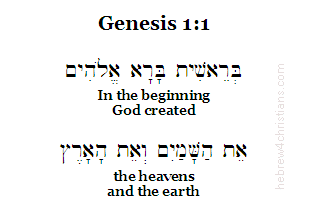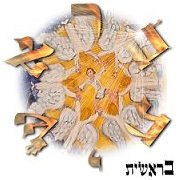|
The Hebrew word bereshit (בְּרֵאשִׁית) can mean "in the beginning" or "at the start" or "at the head of (all things)," etc. (notice the term rosh (ראשׁ, "head") appears embedded in the word as its shoresh (root)). In Jewish tradition, the word can refer to either the first weekly Torah portion (parashah) in the annual Jewish cycle of Torah reading (called "parashat Bereshit") or to the first book of the Torah itself (called "Sefer Bereshit"). When used to refer to the first book of the Torah, bereshit is sometimes called sefer rishon (the First Book) or sefer beri'at ha'olam (the Book of the Creation of the world). The ancient Greek translation of the Torah (i.e., the Septuagint) called the book "Genesis" (Γένεσις: "birth", "origin") instead of using the translation of the first Hebrew word (בְּרֵאשִׁית), i.e., ἐν ἀρχῇ, for the book's title. The term "Genesis" was used in subsequent Latin and English translations of the book. There are fifty chapters in Bereshit (20,512 words, 78,064 letters) that are divided into twelve weekly readings.
This is the very first parashah of the weekly Torah reading schedule, most appropriately named bereshit, meaning "in the beginning." The portion opens with this succinct statement about the creative activity of God:
בְּרֵאשִׁית בָּרָא אֱלהִים
אֵת הַשָּׁמַיִם וְאֵת הָאָרֶץ
be·re·sheet · ba·rah · e·loh·heem
et · ha·sha·ma'·yeem · ve·et · ha·a'·retz

"In the beginning God created
the heavens and the earth." (Gen. 1:1)
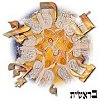
Hebrew Lesson:
Genesis 1:1 Hebrew reading (click):
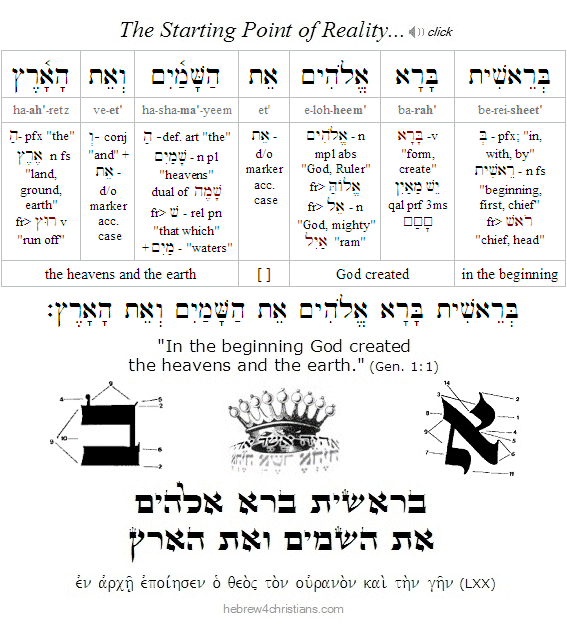 |
Note that the Hebrew Scriptures begin - not from the first person perspective of some man's understanding of God - but from an omniscient third person perspective, a Voice that reveals the Glorious Power that created the entire cosmos by means of His Word. The very first verse of the Bible, then, reveals the triune nature of God, further indicated by the use of the plural form of the name Elohim with the singular verb bara (he created). Indeed, later in this parashah we will read a direct quotation from this Elohim that uses plural personal pronouns: "Let us make man in our image and in our likeness" (1:26).
After this breathtaking opening declaration, shrouded as it is in mystery, the Torah describes how Elohim created the universe yesh me'ayin - out of nothing (Heb. 1:3) over a six "day" period, culminating in the personal creation of a human being b'tzelem elohim - in the image of Elohim Himself.
The first day (yom) of creation is introduced with the vision of the earth as tohu vavohu (without form and void), and the Spirit of Elohim is seen hovering over the waters. Then the first direct quotation of Elohim is given: yehi or (let there be light!), with the added commentary that Elohim then saw that the light was tov (good) and separated it from the darkness (choshek). The Divine Narrator then adds that Elohim called the light yom (day) and the darkness lialah (night), and so ends the first day.
The first day is another great mystery, suggesting some sort of divine determination of both good and evil, light and darkness, and the creation and division of time. The phrase vaihi erev, vaihi voker yom echad ("And there was evening and there was morning, the first day") is also the basis for reckoning the start of the Jewish day at sundown (erev) rather than at sunrise (boker).
I do not have the time to walk through each of the subsequent days in detail, so it will have to suffice to give a quick overview. On the second day, Elohim formed the canopy (rakia') above the earth, dividing the "upper waters" from the "lower waters." Elohim called the physical canopy heaven (shamayim). On the third day He set the boundaries of land (eretz) and seas (yamim) and called forth trees and seed-bearing vegetation from the earth. On the fourth day He fixed the position of the sun, moon and stars to establish the times and seasons (mo'edim) and to be illuminators of the earth. Fish, birds and reptiles are created on the fifth day (they are the recipients of the first personal blessing from Elohim), and on the sixth day, Elohim created land animals and finally the human being (adam, from adamah, earth), created b'tzelem elohim, as already mentioned above. Elohim ceased work on the seventh day, and sanctified it as a day of rest (shavat, from which the word Shabbat is derived). Thus ends the primary account of creation, from Genesis 1:1 through 2:3.
Beginning with Genesis 2:4, the Divine Narrator gives us a closer look at the creation of Adam, and Elohim is further revealed by means of the personal Name YHVH - the Sacred Name of God. It is generally thought that Elohim is the Name given as the Creator of the universe, implying strength, power, and justice, whereas YHVH expresses the idea of God's closeness to humans. For example, it is YHVH who "breathed into his (Adam's) nostrils the breath of life" to become a living soul (nephesh chaiyah), formed (yatzar) him from the dust of the earth, and then placed him in the Garden of Eden (gan eden), the original paradise.
In gan eden was etz hachayim, the tree of life, as well as etz hada'at tov vara, the tree of the knowledge of good and evil. Adam's first responsibility before the LORD was to work (avodah) and guard the garden, and to refrain from eating from the tree of the knowledge of good and evil.
Originally Adam was created as a single person; but the LORD decided that it was not good for him be alone, and therefore paraded all of the land animals before him to see what he would name them. After experiencing all of the various animals of the earth, the LORD put Adam into a deep sleep and formed a woman from his "side" so that she would be ezer kenegdo - a "helper in front of him." Upon awakening, a happy Adam called her ishah, and they were made basar echad (one flesh) through the very first marriage ceremony on the earth.
After this, the serpent (hanachash) is introduced as the "shrewdest of the animals" that the LORD created upon the earth. His first recorded words were a hissing question directed to the woman: "Did God really say, 'You (pl) shall not eat of any tree in the garden?'" The woman correctly answered that God had forbidden that they eat of the fruit of the tree of the knowledge of good and evil on pain of death, but the serpent lied to her about the deadly consequences and implied that the LORD was withholding special insight from them that would enable them to be "as gods." Then the woman began her fatal plunge into evil as she first believed the lie (mind), then looked at the fruit (sight), then took from the tree (action), and finally ate from the tree in direct violation of God's command (sin). Adam, who was "with her" at this time, also knowingly ate of the fruit offered to him from his wife.
This act of treason against the will of the LORD is sometimes called the "Fall of Man," and is of enormous consequence, resulting in the immediate banishment from the garden, the curse of God upon mankind, and the ultimate judgment of death. In pronouncing judgment upon the serpent, however, the LORD prophesied that a cosmic struggle for the fate of humanity would ensue. Through his machinations, Satan (represented by the serpent) had arrogated a legal or forensic "right" to humanity, who were now under divine kelalah (curse). However, the LORD promised to rescind the curse by means of the Seed - the Mashiach - who would "crush the head" of the serpent and restore mankind to blessed paradise. The entire redemptive story of the Scriptures is about this cosmic conflict to deliver humanity from the kelalah by means of the "Seed of the woman" who would come.
The parashah then describes some of the dire consequences of the Fall of Man, as Adam and Eve (chavah) are banished from the garden, and the first family of the earth is shown to be extremely dysfunctional. In a fit of jealous rage, Adam and Eve's firstborn son Kayin (Cain) murders his younger brother Hevel (Abel) and then is divinely banished from his family. The narrative goes on to describe some of the wretched offspring of the line of Cain, but then turns to focus on Set ("compensation"), the third son of Adam and Eve, whose descendants "began to call upon the Name of the LORD" (Seth had a son named Enosh ("man"), a clear picture of the coming bar enosh, or Son of Man (Dan 7:13)).
The parashah next traces the genealogy of Shet (Seth), whose tenth-generation descendant, Noach (Noah), is described as the only tzaddik (righteous man) in the entire earth. The portion ends with the verdict that God would destroy mankind from the face of the earth. However, Noach found favor (chen) with the LORD.
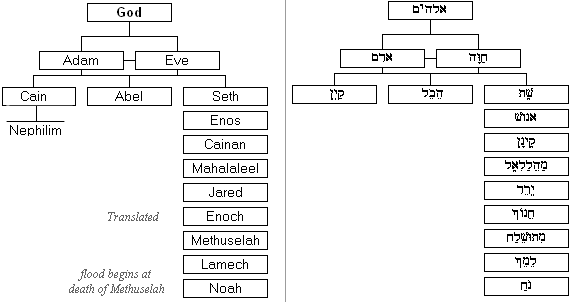 |
|


